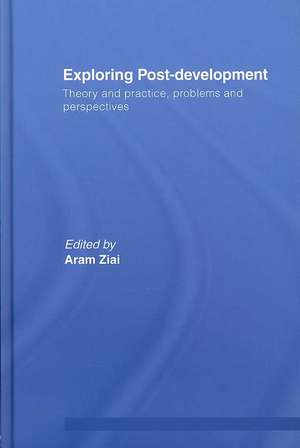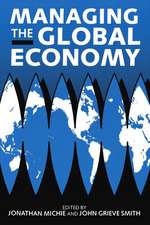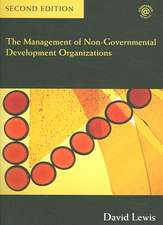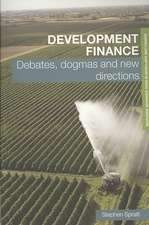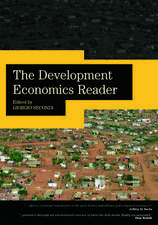Exploring Post-Development: Theory and Practice, Problems and Perspectives: Routledge Studies in Human Geography
Autor Aram Ziaien Limba Engleză Hardback – 26 apr 2007
| Toate formatele și edițiile | Preț | Express |
|---|---|---|
| Paperback (1) | 432.29 lei 6-8 săpt. | |
| Taylor & Francis – 11 noi 2013 | 432.29 lei 6-8 săpt. | |
| Hardback (1) | 823.08 lei 6-8 săpt. | |
| Taylor & Francis – 26 apr 2007 | 823.08 lei 6-8 săpt. |
Din seria Routledge Studies in Human Geography
-
 Preț: 332.18 lei
Preț: 332.18 lei -
 Preț: 371.71 lei
Preț: 371.71 lei -
 Preț: 334.09 lei
Preț: 334.09 lei -
 Preț: 341.09 lei
Preț: 341.09 lei - 18%
 Preț: 1057.75 lei
Preț: 1057.75 lei - 18%
 Preț: 1072.71 lei
Preț: 1072.71 lei - 12%
 Preț: 299.87 lei
Preț: 299.87 lei -
 Preț: 490.62 lei
Preț: 490.62 lei - 28%
 Preț: 823.63 lei
Preț: 823.63 lei - 18%
 Preț: 1058.79 lei
Preț: 1058.79 lei - 18%
 Preț: 1054.71 lei
Preț: 1054.71 lei - 13%
 Preț: 296.11 lei
Preț: 296.11 lei - 18%
 Preț: 1057.89 lei
Preț: 1057.89 lei - 28%
 Preț: 822.76 lei
Preț: 822.76 lei - 18%
 Preț: 732.06 lei
Preț: 732.06 lei -
 Preț: 414.32 lei
Preț: 414.32 lei - 18%
 Preț: 1062.98 lei
Preț: 1062.98 lei - 18%
 Preț: 702.31 lei
Preț: 702.31 lei - 18%
 Preț: 1057.09 lei
Preț: 1057.09 lei - 18%
 Preț: 1169.66 lei
Preț: 1169.66 lei - 18%
 Preț: 1114.98 lei
Preț: 1114.98 lei -
 Preț: 408.54 lei
Preț: 408.54 lei -
 Preț: 419.50 lei
Preț: 419.50 lei -
 Preț: 373.59 lei
Preț: 373.59 lei - 5%
 Preț: 353.14 lei
Preț: 353.14 lei - 18%
 Preț: 1055.06 lei
Preț: 1055.06 lei - 18%
 Preț: 1058.69 lei
Preț: 1058.69 lei - 18%
 Preț: 1065.06 lei
Preț: 1065.06 lei - 18%
 Preț: 1060.87 lei
Preț: 1060.87 lei - 18%
 Preț: 1069.92 lei
Preț: 1069.92 lei -
 Preț: 418.65 lei
Preț: 418.65 lei -
 Preț: 446.58 lei
Preț: 446.58 lei -
 Preț: 408.74 lei
Preț: 408.74 lei -
 Preț: 423.30 lei
Preț: 423.30 lei - 18%
 Preț: 1055.51 lei
Preț: 1055.51 lei - 28%
 Preț: 878.82 lei
Preț: 878.82 lei - 18%
 Preț: 1061.57 lei
Preț: 1061.57 lei - 28%
 Preț: 849.84 lei
Preț: 849.84 lei - 18%
 Preț: 733.11 lei
Preț: 733.11 lei - 28%
 Preț: 852.64 lei
Preț: 852.64 lei - 12%
 Preț: 338.81 lei
Preț: 338.81 lei - 26%
 Preț: 764.20 lei
Preț: 764.20 lei
Preț: 823.08 lei
Preț vechi: 1142.34 lei
-28% Nou
Puncte Express: 1235
Preț estimativ în valută:
157.50€ • 165.62$ • 130.14£
157.50€ • 165.62$ • 130.14£
Carte tipărită la comandă
Livrare economică 17 aprilie-01 mai
Preluare comenzi: 021 569.72.76
Specificații
ISBN-13: 9780415417648
ISBN-10: 0415417643
Pagini: 256
Ilustrații: 1 line drawing
Dimensiuni: 156 x 234 x 19 mm
Greutate: 0.63 kg
Ediția:1
Editura: Taylor & Francis
Colecția Routledge
Seria Routledge Studies in Human Geography
Locul publicării:Oxford, United Kingdom
ISBN-10: 0415417643
Pagini: 256
Ilustrații: 1 line drawing
Dimensiuni: 156 x 234 x 19 mm
Greutate: 0.63 kg
Ediția:1
Editura: Taylor & Francis
Colecția Routledge
Seria Routledge Studies in Human Geography
Locul publicării:Oxford, United Kingdom
Public țintă
PostgraduateCuprins
Part 1: Introduction 1. Development Discourse and its Critics: An Introduction to Post-Development, Aram Ziai 2. 'Post-Development' as Concept and Social Practice, Arturo Escobar Part 2: Theory 3. Development: The Devil We Know, Knut G. Nustad 4. Post-Development and the Discourse-Agency Interface, Jon Harald Sande Lie 5. On the Singular Name of Post-Development: Serge Latouche's Destruktion of Development and the Possibility of Emancipation, Yoshihiro Nakano Part 3: Problems 6. Pacific Indigenous Development and Post-International Realities, Susan Maiava and Trevor King 7. Post-Development and Further: Difference from 'Inside' and Autonomy Luciole Sauviat 8. The Ambivalence of Post-Development: Between Reactionary Populism and Radical Democracy, Aram Ziai Part 4: Practice 9. What, Then, Should We Do?: Insights and Experiences of a Senegalese NGO, Sally Matthews 10. Surplus Possibilities: Post-Development and Community Economies, J. K. Gibson-Graham 11. Plachimada Resistance: A Post-Development Social Movement Metaphore, K. Ravi Raman 12. Comida: A Narrative Mirror for the Universal Concept of Nutrition, Martina Kaller-Dietrich Part 5: Perspectives 13. Post-Development: Unveiling Clues for a Possible Future, Ana Agostino 14. Development, Internationalism and Social Movements: A View From the North, Friederike Habermann and Aram Ziai 15. Concluding the Exploration: Post-Development Reconsidered, Aram Ziai
Notă biografică
Aram Ziai has studied political science/international relations and sociology in Aachen, Dublin and Hamburg. Currently, he is a research fellow at the University of Amsterdam. His main areas of research include north-south relations and development policy, critical theories of international relations, migration and social movements.
Descriere
Post-development has been a major debate in the field of north-south relations at the beginning of the twenty-first century, here contributors explore the limitations of this theory and practice using empirical studies of movements and communities globally.
